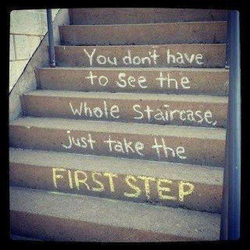
Fear Is Not to Be Feared
Fear keeps us safe. It gives us parameters to work within. It forces us to plan ahead for obstacles and consequences. Fear of potential consequences is what keeps most people from breaking the law/rules. It's why you suddenly slow down when you see a cop even though you weren't speeding. It doesn't keep you from driving anywhere, but it does make you more vigilant. Fear should produce respect for boundaries and yet not limit how we operate within the expectations.
Fear can also be a source of motivation. It helps us set goals to avoid those failings we realize could happen. It helps us seek the knowledge and skills we need to be successful so we can avoid failure or the consequences of not changing/improving.
Fear is a problem when it paralyzes us and keeps us from moving forward. When we analyze why some people resist change, it is often grounded in the fears they have of their own personal misunderstanding, shortcomings, or the unknown. It may be compounded by past failures too. Fear blinds us to the possibilities that exist and won't let us get past the "yes buts" that plague our thoughts. Fear whispers in our ear that it's OK to be safe and never OK to take a risk. And when we listen without considering possibilities, fear's grip on us becomes even tighter.
When fear controls us we put up walls; we resist assistance; we make excuses; we blame; we dwell on the darkness instead of the light. Can't and won't become 4-letter words that dominate our thoughts and conversations. How do we get our fear under control?
Knowledge is Power
My son is a smart man and of course started out as a smart little boy. But he had one trait that was going to keep him from being successful in life and that was the fear of trying new things. In some cases it was fear of failure, but mostly it was just fear of the unknown. Anxiety plagued him from trying new foods to even playing games that were supposed to be fun! Eventually after a lot of support from his teachers, and encouragement from his family and friends, he was able to understand that if he learned enough about each situation, he could be persuaded to try it. Baby steps. Where food once was something he rarely experimented with, he now loves to cook and try new things! He loves the "chemistry" of food and spice combinations so suddenly food isn't a scary thing now. Of course there are still things he won't eat, but he isn't going to starve either!
To gain this knowledge, you have to ask the right questions and do your homework. Consider the options available. Ask what will happen if I don't do this? What could happen if I do? What do I already know? How much do I have to know to get started and will I be able to increase my knowledge as I progress? But ultimately, action becomes necessary because if you do nothing you will gain nothing.
Focus on What You CAN DO Rather Than on What You Can't Do
Your thoughts shape your destiny. We often sell ourselves short, not feeling like what we have to offer (in terms of skills, abilities, talents, etc.) will make a difference to others. Sometimes we find a task may be asking more of us than what we think can accomplish. So to overcome these self-doubts we must focus on what we CAN DO. One way is to turn the job into manageable chunks that seem less overwhelming which can also provide us with success points along the way. In addition, we must learn to trust the confidence that others have in us, and be willing to share or utilize our talents in a small way initially until we can learn to appreciate what we have to offer on a bigger scale. For example on a large project we can offer to be a piece of the puzzle because helping the team be successful will allow us to feel good about our contribution, which in turn might lead to a bigger contribution the next time.
When we do stumble, we must reflect on the experience and find ways to improve or new ways to tackle the issue at hand. Failure only comes when we fail to learn or fail to try again. As Thomas Edison once said, "I have not failed. I've just found 10,000 ways that won't work!"
Implications for Educators and Parents
Understanding the role that fear plays in our lives is critical to our success. As parents and educators, we must find ways to guide our children/students through the choppy waters of life that can be scary at times. We must provide them with the necessary knowledge and skills that give them a chance to be successful; let them practice in safe situations; and allow them to fail and learn from their mistakes. It is natural to want to protect our children or students from the unpleasantness of life, but if we always "save" them from failure, they will never learn to use those opportunities as learning experiences, and fear of failure will become an even greater issue.
As I noted in my last blog, optimism springs from hope. Too much fear squelches optimism and hope. We must find ways to build trust and have faith. Building a background of knowledge and skills, and focusing on what CAN be done will help to keep fear in check and allow us to consider the many possibilities that exist for us in all that we do. And then above all, Never, Never, Never Give Up!
 RSS Feed
RSS Feed